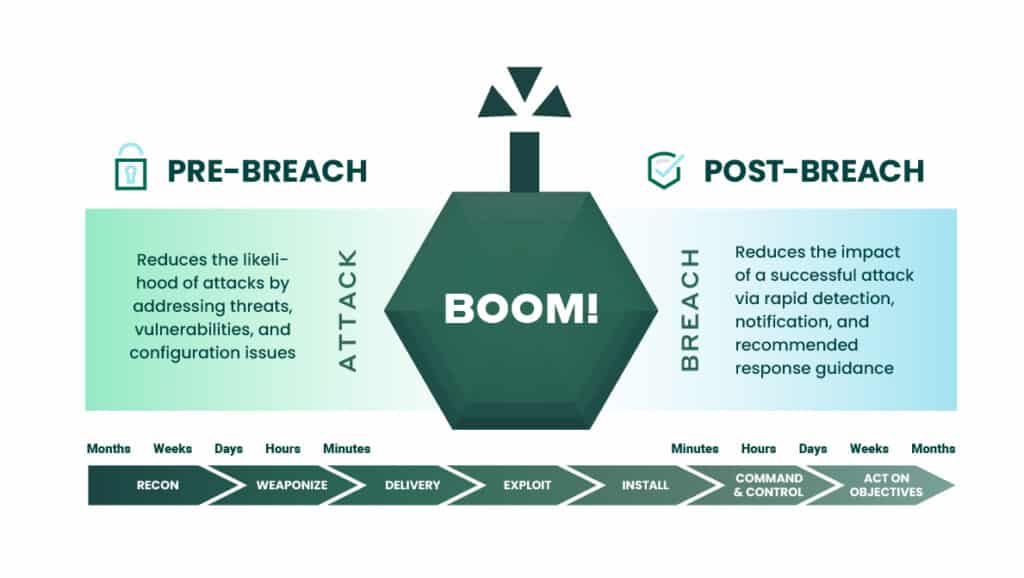When evaluating managed security solutions, you may be asking yourself — MDR vs. MSSP. These two solutions often go head-to-head in the industry, as many perceive them to be relatively similar. Upon digging deeper, you’ll find that while each have their own benefits, they also come with some significant differences — differences that can make or break your decision.
We’re examining six differences you need to be aware of when selecting a cybersecurity solution and how to decide which works best for your organization.
What Is MDR?
Managed detection and response (MDR) solutions identify active threats and quickly respond to either eliminate, investigate, or contain them. These solutions use a combination of technology and human expertise to monitor your environment, catch emerging and active threats, and respond accordingly.
MDR significantly reduces the time it takes for companies to detect compromised assets. To put this in perspective, in 2024, on average it took 283 days to identify and contain a breach; with an MDR solution, it can take mere hours.
[Related Reading: What Is Managed Detection and Response?]
What Is a MSSP?
Managed security service providers (MSSPs) monitor security networks and send alerts when an anomaly is detected.
Since MDR is often viewed as a subset of MSSP, you might wonder how the two compare. While MSSP may be considered the broader solution and not directly equivalent to MDR, they are frequently weighed against each other in the industry when evaluating security options.
In actuality, either one can be effective — the choice depends on the organization and the needs to be met. MSSPs are widespread and offer a bird’s eye view of your security posture. MDR, on the other hand, goes deeper, leveraging the human expertise required to best detect and analyze any threats and respond to vulnerabilities.
While MSSPs often include MDR services, their primary focus is on prevention rather than actively eliminating threats. The responsibility for responding to threats typically falls on the customer. In fact, it’s common for MSSPs to partner with or acquire additional services to cover this crucial response capability.
[Further Reading: What Is an MSSP?]
MDR vs MSSP: What’s the Difference?
Although both MDR and MSSP offer valuable benefits, there are key differences in their functionality that should guide your choice. First, it’s crucial to understand the distinction between pre-breach and post-breach services.
Keeping that in mind, let’s jump into the key differences between MDR and MSSP:
MSSPs focus on prevention
MSSP solutions often include firewalls, web gateways, intrusion prevention systems, and a host of other antivirus tools that keep threats out of your network. This is pre-breach territory, where MSSPs place focus and help to manage your prevention tools.
MDR is driven by intelligence from data and humans
With a team of cybersecurity professionals at the ready in a 24/7 global security operations center (SOC), MDR services focus on both detection and response and have the ability to actively monitor your network and act when needed. MSSPs rely more on automation to monitor networks and often exclude the response element of cybersecurity — you would only be notified that the threat exists.
MDR works around the clock
Most MDR solutions function on a 24/7 capacity thanks to a well-staffed security operations center. This way, you can be alerted to new threats and respond to them almost instantaneously. MSSPs usually have much more limited monitoring capabilities.
MDR offers more forensics tools
MSSPs have a basic level of security forensics, adequate for small and mid-sized companies, but MDR often includes forensic tools that can reveal problems hiding in the darkest corners of your network.
MSSPs are cheaper
Since MSSPs offer fewer services than most MDR solutions, they usually come with a smaller price tag.
Which Is Best for Your Organization?
As organizations have different needs and varying levels of existing security expertise and solutions, the MDR vs MSSP decision can be difficult. Here are a few tips to help you weigh the options and select the best solution to achieve your desired outcomes.
When to Choose MDR
MDR offers advanced monitoring and threat resolution, best suited for you if:
- Your organization has a regulatory requirement to uphold a high level of security
- You want to upgrade your current cybersecurity tools to include 24/7 monitoring and automated response, but you are resource constrained
MDR service providers are dedicated to researching, analyzing, and detecting threats to be able to address them quickly and efficiently. While an MDR solution provider may not offer as wide a range of services as an MSSP, they specialize in ensuring that everything remains up-to-date and functions properly. MDR has proven to be one of the most effective solutions within the broader scope of MSSP offerings.
When to Choose MSSP
While MSSPs may not offer services as extensive as MDR, consider this solution if you:
- Lack a cybersecurity monitoring system
- Lack a patching program
- Have the skillset within your organization to manage the tools you have purchased
MSSPs offer a broad array of services that cover many aspects of cybersecurity, but often only at a surface level. For example, they might focus on tasks like web content filtering, system patching, or firewall management. While these are important, they typically don’t require specialized security expertise and don’t extend to more critical functions like detection and response. MSSPs tend to be most effective when they incorporate and integrate third-party tools for comprehensive security management and response.
Protect Your Network with Alert Logic
Learn how Alert Logic MDR could help your business. Our cybersecurity experts will help you safeguard your business, giving you peace of mind by protecting your network and organization from potential threats.

